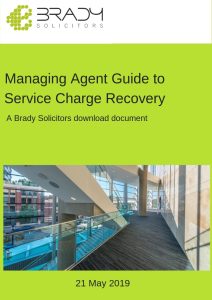Leasehold properties regularly change hands without the knowledge of the managing agent and without the service charge arrears being settled.
It can then be a challenge to know who – and how – to chase for these arrears: is it the old leaseholder or the new one? And what debt recovery procedure should they follow?
Brady Solicitors explain the legal position and gives some practical advice to both managing agents and leaseholders.
When one of your leaseholders sells their flat they should – in an ideal world – settle any outstanding service charge and ground rent arrears and, importantly, tell you, the managing agent, about the sale. In fact, this latter point is nearly always stipulated in the lease.
If there are outstanding arrears, these can be paid by the seller before completion or paid as part of the completion by the purchaser, and the purchase price adjusted accordingly. This allows the new leaseholder to start with a clean slate, without the worry of any pre-existing service charge debts.
The leasehold conveyancing position
Back to the real world and, unfortunately, leasehold purchasers often opt for the cheapest conveyancing quote and end up owning their new flat without getting proper advice on the associated liabilities.
There is no obligation on the seller’s solicitors to disclose information about any outstanding service charge arrears.
So, if there is an existing service charge debt, the buyer won’t know about it if their solicitor doesn’t make the appropriate enquiries.
Buyers can be reassured that, under The Landlord and Tenant (Covenants) Act 1995, the arrears remain the liability of the previous leaseholder and do not pass on to the new owner. However, if there is evidence of a breach of lease by the seller, forfeiture proceedings can be brought against the new owner of the flat – a rather unwelcome housewarming gift, most would agree! And, as we set out at the start of this article, selling a leasehold property without informing the managing agent can be a breach of lease in many situations.
How to recover service charge debts when a flat is sold
The first step is to pursue the seller for the arrears. If there has been no provision to transfer the arrears to the new owner, then the correct process is to issue proceedings (in either the county court or at the FTT) against the seller in order to obtain a judgment for their repayment.
We always recommend that you send a copy of these proceedings to the buyer.
Whilst the new owner is unlikely to be keen to pay the previous leaseholder’s bill, when they recognise there is a risk of forfeiture proceedings they may decide to settle up in order to avoid the ongoing hassle and costs.
Assuming you have secured the judgment at the first stage, you then need to decide whether to pursue the seller or the buyer for the arrears. Some former leaseholders will pay up immediately, not wanting to have a judgment against their name. Others will simply ignore it. We generally recommend that you seek to enforce the judgment against the current leaseholder – the buyer.
So the next step is to issue forfeiture proceedings against the buyer. Because the lease has been breached through non-payment of service charge arrears, albeit by the seller, you can issue proceedings against the buyer to forfeit. And, as the new owner of the property, they are likely to settle quickly. Additionally of course, by pursuing the buyer, you can rely on any cost clauses in the lease to ensure you can recover your legal costs.
If you are a leaseholder and find yourself in the unwelcome position of inheriting unknown service charge arrears or enforcement actions, you may have grounds for action against your conveyancing solicitor for potential negligence.
In the very unlikely situation that forfeiture proceedings fail, you can resort to personal enforcement proceedings against the seller. But be aware that this may involve bankruptcy proceedings and there is no guarantee you will be able to recover your legal costs.
So, in summary, where service charges remain unpaid, you should bring proceedings against the seller. However, by advising the purchaser that their property may be subject to forfeiture if the service charge arrears remain unpaid, you may be able to persuade them to settle the service charge to avoid this risk.
Take care to avoid waiving the right to forfeit
If you issue service charge demands – and collect monies – for periods after the leasehold assignment has taken place, you run a high risk of waiving the right to forfeit. It is very common for managing agents (and landlords) to end up in a situation where they have accidentally waived the right to forfeit the lease, simply because they have ‘carried on as normal’.
Without the right to forfeit you lose the ability to recover the service charge arrears from the buyer. And, whilst the buyer won’t want to pay the old owner’s debt, they arguably have more interest in settling it.
Brady Solicitors recommend that you put processes in place to make sure that service charge demands for the post-sale period are not issued to the new leaseholder.
What about balancing charges?
The situation becomes more complicated where the lease states that a separate balancing charge should be issued at the end of a service charge year to resolve any shortfall in the service charge amount.
Essentially, the balancing charge will be payable by whoever holds the lease at the time when the payment falls due. So, if the seller is up-to-date with their service charge payment but sells the flat before the balancing charge is due, then it is the purchaser who will be responsible for paying this charge.
Ensure you understand exactly when the balancing charge is due and when the lease assignment took place.
You can also save unwelcome surprises by making regular enquiries at your estates to check whether any flats have been put on the market.
Dealing with service charge debts when a lease is assigned can be tricky. But, there are clear routes open to you as the managing agent if you end up with a new leaseholder and old service charge arrears.
Contact the service charge specialists at Brady Solicitors.


